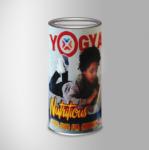SUPER BRAIN FOOD FOR CHILDREN
by Kishor Meswani NETWORK MARKETING ENTREPRENEUR Children need to be provided with a nutrient-rich diet that can meet the needs of their growth and development. Yogya offer condition-specific supplements to improve the concentration and brain develo
Recommended Features
Children need to be provided with a nutrient-rich diet that can meet the needs of their growth and development. Yogya offer condition-specific supplements to improve the concentration and brain develo
Recommended Features
- Improved concentration and learning
- Having a calming effect on their behaviour
- Treating Developmental Coordination Disorder/dyspraxia
- Positive effect on the behaviour of children suffering from attention deficit hyperactivity disorder
- Healthy growth
Review on SUPER BRAIN FOOD FOR CHILDREN
Super Brain Food For ChildrenBacopa Monneiri: Brahmi:
Brahmi is loaded with antioxidants and carries a number of substances that stimulate neurotransmitter function in the brain. It is considered a brain and nerve tonic. Brahmi regenerates nerve cells and it also revitalizes brain cells. As people age, their ability to regenerate cells in the brain affects their memory and recall centers. Brahmi promotes retention and recall.
Nardostachys Grandiflora: Jatamansi:
The herb is used as a brain tonic, which gives peace and a sense of calmness to mind. It also regularizes digestion, respiration and eliminates general body weakness.
Convolvulus Pluricaulis: Shanka pushpi:
Shankhapushpi is used traditionally to treat nervous debility, insomnia, fatigue, low energy level. It is considered to be the only herb which has the ability to enhance all the aspects connected to brain power, for example memory, learning, and the ability to recall.
Celastrus Paniculatus: Jyotishmati:
It helps enhance the memory and learning process.
Acorus Calamus: Vacha:
Vacha is used as a nervine tonic having a positive effect on the memory and the learning process.
Ocimum Sanctum: Tulsi:
It has anti bacterial and anti fungal properties that help to rejuvenate the skin. Ocimum sanctum is quite effective in the treatment of coughs, sore throats and other symptoms of common cold. It strengthens the body's ability to resist viral and bacterial infections and fevers. It helps in aiding the digestion process and cleaning the intestines, thus detoxifying the body. It promotes a healthy respiratory system and can be used to treat bronchitis, asthma and allergies.
Glycyrrhiza glabra: Yashtimadhu/Licorice:
It is used as a rejuvenating herb and as an immune booster. It helps in suppressing cough by soothing irritated throat. Yashtimadhu is a natural antacid and is also known for its potent anti-viral activity.
Tinospora Cordifolia: Guduchi:
It is considered a premier adaptogenic herb. It helps build the body's immune system and resists infections. The herb accords longevity, enhances memory, improves health and bestows youth, betters complexion, voice, energy and luster of the skin. It is helpful in treating digestive ailments such as hyperacidity, colitis, worm infestations, loss of appetite, abdominal pain, excessive thirst, and vomiting and even liver disorders like hepatitis.
Triphala:
Triphala is considered a 'tridoshic rasayan', having balancing and rejuvenating effects on the three constitutional elements that govern human life, namely Vata, Pitta and Kapha. It is considered as the best colon cleanser as all three herbs in Triphala are laxative in nature and very beneficial in removing toxins.
Boerhavia Diffusa: Punarnava:
It rejuvenates the whole body and helps in blood formation. It improves the functioning of the metabolism. It promotes healthy digestion and in general, works as a health tonic, which prevents swellings, pain, removes imbalances and reverses ageing. Not only does it detoxify the liver and the body, it provides nourishment as well.
Aloe Barbadensis: Aloe Vera:
Known as the "plant of immortality," Aloe vera is being used topically to heal wounds and for various skin conditions, and orally as a laxative, since centuries. Aloe Vera contains over 75 known active ingredients (and probably many more). Also included are 19 of the 20 amino acids required by the human body and 7 of the 8 essential amino acids (that the body cannot make), as well as vitamins and minerals. There are 20 "critical" Amino Acids in human metabolism, but the body can only make 12, the other 8 have to be obtained from food. Aloe Vera contains important minerals like Calcium, Chromium, Copper, Iron, Magnesium, Manganese, Potassium, Phosphorous, Sodium, and Zinc.
Prunus Amygdalus: Almond Extract:
It is rich in omega 6, omega 9, dietary fiber, proteins, plus a lot more. It boosts skin look and enhances power. It provides a good supply of proteins and is rich in monounsaturated fatty acids as well as soluble fiber. Almond extract is an outstanding source of vitamin E and mineral deposits including magnesium, calcium mineral, and phosphorus.
Embelia Ribes: Vidanga:
It is a germicidal and bactericidal herb. It is a widely known cure for various health disorders. The herb is digestive, appetizer, rejuvenator and blood purifier.
Emblica Officinalis: Amla:
It is a potent anti-oxidant which is high in Vitamin C. It prevents aging and promotes longevity by boosting our immune system. It helps in improving eye-sight as well.
Linum Usitatissimum: Flax Seed Extract / Omega3:
Omega-3 fatty acid found in flaxseed, called ALA, inhibited tumor incidence and growth. Some of the other components in flaxseed also have antioxidant properties, which may contribute to protection against various diseases. Vital to Brain Development: Omega-3 acids (DHA, EPA and ALA) are essential fatty acids that may play a critical role in a childs learning ability, brain function and brain development.
Ostrea Edulis: Oyster Shell Calcium:
It contains 85 to 95 % Calcium Carbonate, Phosphate and sulfate of calcium and magnesium, oxide of iron, alumina and silica. It helps reduce the risk of osteoporosis and promotes healthy joint function.
Iron:
Iron is an essential component that makes up part of many proteins in the body. Iron is found in every cell of the body. Iron is considered an essential mineral because it is needed to make part of blood cells. Iron also seems to play a role in brain development: cognitive, motor, social-emotional, and neurophysiologic development. Research emphasizes the importance of protecting the developing brain from iron deficiency.
Vitamin A
Essential for Vision, Growth, and Development: Vitamin A helps form and maintain healthy teeth, skin, skeletal and soft tissue, mucous membranes, reproduction, cell division and gene expression.
Vitamin C:
The Brain Retains Vitamin C: Vitamin C, also known as ascorbic acid, is a water-soluble vitamin that is not manufactured in the body and must be obtained from outside sources. Vitamin C is important for your skin, bones, and connective tissue. It promotes healing and helps the body absorb iron.
Vitamin E:
A Powerful Antioxidant: Vitamin E, a fat-soluble vitamin, is an antioxidant that protects body tissue from damage caused by unstable substances called free radicals. Free radicals can harm cells, tissues, and organs. It protects Vitamin A and essential fatty acids from oxidation and prevents breakdown of body tissues.
Vitamin D:
A Key Ingredient to Strong Bones and Bodies: Vitamin D enables bones and teeth to grow properly and helps a childs body absorb calcium and phosphorous the building blocks for strong, healthy bones. Vitamin D is stored in the skin, brain, spleen, and bones and promotes a childs neuromuscular development and a healthy immune system function. Recent studies suggest many children are Vitamin D deficient.
Vitamin B:
The B vitamins were once thought to be a single vitamin, referred to as vitamin B. Later research showed that they are chemically distinct vitamins that often coexist in the same foods. The vitamin B complex consists of 12 related water-soluble substances. Eight are considered essential vitamins because they need to be included in the diet. Four are not essential because the body can synthesize them.
Choline:
The Memory Vitamin Vital to Brain Development: Choline is a member of the Vitamin B group of nutrients that supports brain function and plays a crucial role in the development of learning and memory in children. Choline is an essential ingredient in the building blocks of all cell membranes, and it is a precursor to a neurotransmitter called acetylcholine, which is a key to many brain and nerve functions, including memory.
Zinc:
For Brain Structure and Function: Zinc is an essential trace element for all organisms. The nervous, reproductive and immune systems are particularly influenced by Zinc deficiency, as well as by increased levels of Zinc. Zinc is present in the brain and contributes to its structure and function. Studies suggest that zinc deficiency may lead to delays in cognitive development and may lead to deficits in childrens neuropsychological functioning, activity, or motor development, and thus interfere with cognitive performance.
Iodine:
Essential for Normal Brain Development: Iodine is essential for the regulation of thyroid function that involves the brain and pituitary gland. Babies and children need iodine to form thyroid hormones, which are important for growth and health.
Niacin:
Niacin is the common name for two very different compounds: nicotinic acid and niacinamide. This vitamin helps the body convert food to energy, to maintain healthy skin, hair, and eyes as well as aiding the maintenance of the nervous and digestive system. One of the major roles of niacin is in the regulation of cellular respiration and in promoting the proper utilization of all the major nutrients at the cellular level.
Pantothenic Acid:
Essential to mental and emotional well-being, this vitamin is considered the Anti-Stress Vitamin because of its important role in the functioning of the adrenal glands, which produce hormones that help our bodies respond to stress. It is needed to form coenzyme-A (CoA) and is critical in the metabolism and synthesis of carbohydrates, proteins, and fats that help the body to convert food to energy. Pantothenic acid is needed for production of antibodies to help fight infection, to stimulate manufacture of antibodies and to promote wound healing. This key vitamin also helps protects nerve, brain, and muscle tissue.
L Lysine:
Lysine is one of eight essential amino acids - building blocks of protein - that the body cannot manufacture on its own. As a building block of protein, l-lysine benefits the body by contributing to growth. L-lysine benefits also include production of carnitine, a substance that converts fatty acids into energy and lowers levels of LDL (bad cholesterol) in the bloodstream. In addition, l-lysine benefits the skeletal system by contributing to the production of collagen, the protein used to make bone, tendons, cartilage and connective tissue. Calcium absorption and use is also facilitated by L-lysine.
Related to SUPER BRAIN FOOD FOR CHILDREN
|
11 Benefits of Shankhpushpi (brain tonic) - YouTube.flv http://www.goherbalsupplements.com/ |
Related Articles
Can You Increase Your Brain Power?
What Do You Think? Can you solve problems easily? Can you learn new things efficiently? Can you increase your brain power? Whatever you think and feel about these questions, those thoughts and fee...Sponsor Ads
Created on Apr 4th 2013 04:21. Viewed 1,941 times.
Comments
|
|
Zimkhitha M.
very educational article. It does seem to be a good product. Apr 4th 2013 07:58 |






very good product for every children......
Apr 4th 2013 05:21